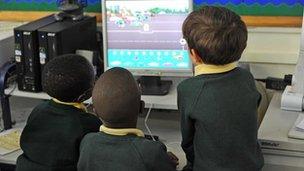Phonics test: More than two-thirds of children pass new phonics test
- Published

More children have passed the new phonics reading test for England's five- and six-year-olds this year.
More than two-thirds (69%) of pupils in state schools reached the expected level - up from 58% last year.
Nearly 180,000 pupils failed to meet the expected standard in the controversial new check, which is carried out at the end of Year 1.
Girls did better than boys - almost three-quarters passed - while about two-thirds of boys did so.
The statistics were published on Thursday by the Department for Education.
This is the second year that pupils have taken the test, which is based on "synthetic phonics", a system that focuses on children being able to identify sounds of letters and groups of letters so that they are then able to decode and read real words.
For the check, the children are asked to sound out 40 words, some of which are made up, such as "voo", "spron" and "terg" - to test their reading skills.
They need correctly to identify 32 out of the 40 phonic sounds to pass.
'Extra support'
Ministers say the phonics check will improve literacy standards by helping to identify children who need extra help with reading and say it has helped to increase schools' focus on phonics.
Education Minister Elizabeth Truss said: "We are committed to improving children's reading.
"The phonics check helps teachers identify those pupils who need extra help in learning to read.
"Many thousands of children will now receive the extra support they need to catch up with their peers and develop a love of reading."
Teaching unions say the phonics check does not tell teachers anything they did not know about their pupils and risks labelling some as failures at an early age.
And they warn that children could be confused by reading "non-words".
Christine Blower, the head of the National Union of Teachers, said: "To be telling five- and six-year-olds that they have failed is quite simply wrong.
"Children develop at different levels, the slow reader at five can easily be the good reader by the age of 11.
"In many other countries with successful education systems such as Finland most children haven't even started school until seven."
- Published12 September 2013
- Published17 September 2013
- Published16 May 2013
- Published5 June 2013
- Published12 September 2013
- Published16 September 2011
- Published27 April 2013